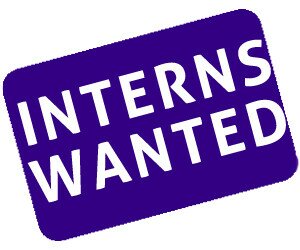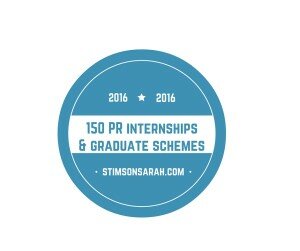 Earlier this week Vuelio published their annual ‘Top 10 UK PR blogs list‘. It’s a great list – I read the vast majority of the blogs on it (although one was completely new to me which is always exciting to find). Stephen Waddington and Neville Hobson top that list – and both are brilliant bloggers so it’s well deserved, but in an industry dominated by women, I was staggered that not a single one of the ten was female. Continue reading
Earlier this week Vuelio published their annual ‘Top 10 UK PR blogs list‘. It’s a great list – I read the vast majority of the blogs on it (although one was completely new to me which is always exciting to find). Stephen Waddington and Neville Hobson top that list – and both are brilliant bloggers so it’s well deserved, but in an industry dominated by women, I was staggered that not a single one of the ten was female. Continue reading
50 UK Female PR Bloggers
Filed under PR, Social Media
Guest blog: Six months in the life of a foreign PR job hunter – Andra Miclaus
 As a PR graduate in Romania, with some experience in event management whilst a student, I moved in the UK a couple of years ago knowing that landing a job in PR would be a mission. Fresh out the plane, I got a job in customer services offering advice on several Government green initiatives. I learnt all the bells and whistles about solar energy and ground source heat pumps. Within six months of my employment, I was the first on the list to had exceeded all targets therefore, I was asked to apply for the team leader vacancy made available. Continue reading
As a PR graduate in Romania, with some experience in event management whilst a student, I moved in the UK a couple of years ago knowing that landing a job in PR would be a mission. Fresh out the plane, I got a job in customer services offering advice on several Government green initiatives. I learnt all the bells and whistles about solar energy and ground source heat pumps. Within six months of my employment, I was the first on the list to had exceeded all targets therefore, I was asked to apply for the team leader vacancy made available. Continue reading
Filed under Careers, Guest blogs, PR
2016: 150 PR internships & graduate schemes
Note: This list has now also been posted on PRcareers.co.uk, along with lots of useful information on careers in the PR industry. The 2017 list has also now been published on PR Careers. If you’re at a PR agency that would like to appear on the 2018 list please contact
Last January I listed entry level opportunities at the top 150 agencies as listed by PR Week. It was a hugely popular blog post so I’m doing in again for 2016.
Filed under Careers, Graduates, PR, Recruitment, Students
5 Cracking Christmas Presents for PRs
- For when they’re pushed to meet that pitch deadline. This GO AWAY I’M WRITING mug sends their colleagues the right message.
Flexibility for returning parents in the PR industry
 I’m off on maternity leave in a couple of weeks to have baby number two. This means I have to leave my other baby, the Taylor Bennett Foundation, in the hands of my (very capable) colleagues. I’ll only be away for four months but it’s still a pretty daunting prospect that at some point I’ll have to stop thinking about feeding, nappy changing and singing wheels on the bus endlessly and revert back to my professional persona. Continue reading
I’m off on maternity leave in a couple of weeks to have baby number two. This means I have to leave my other baby, the Taylor Bennett Foundation, in the hands of my (very capable) colleagues. I’ll only be away for four months but it’s still a pretty daunting prospect that at some point I’ll have to stop thinking about feeding, nappy changing and singing wheels on the bus endlessly and revert back to my professional persona. Continue reading
What graduates don’t know about PR careers
I have often argued that one of the reasons that there is such a lack of diversity in PR is that graduates from more diverse backgrounds don’t know enough about the industry to consider it a viable career option. Partly because with a lack of black and ethnic minority role models in communications there are very few people to tell them about what an interesting and challenging career it can be.
But it’s not just ethnically diverse candidates who lack a proper understanding of the industry and I get asked similar questions all the time from all types of graduates who are puzzled by the communications industry and would like to know more, but don’t know where to start.
So, if you’re a student or graduate listen up, here’s what you need to know that no one else has told you.
Public Relations is a very broad term
What does PR mean to you? Do you immediately think of champagne swilling celeb promoters? If you do, you’re not alone. Even seasoned PR practitioners can struggle to explain what public relations is but what you really should know is that it is such a broad term that encompasses many, many different disciplines and sectors – including corporate communications, consumer PR, corporate social responsibility, digital PR, media relations, internal communications, crisis management, brand management, public affairs, financial PR, healthcare PR, technology PR… the list goes on and on and on. Make sure you properly understand all the options before dismissing it as not for you – you may be surprised at the variety of work available in the communications industry.
You don’t need a PR degree
PR degrees have become increasingly popular over the last few years and some of them are very good, but you don’t need one to start a career in PR. In fact, you don’t need a degree at all in many cases as some employers are much more interested in commitment and experience than what you did for three years at university. PR degrees vary and some of them are really not that helpful when it comes to your first job – I know of graduates who spent three years at university and never read any media other than The Metro. I don’t even know how it’s possible to study PR without a broad understanding of the media landscape and current affairs but apparently it’s perfectly possible as they graduate with good grades. If you’re going to study PR with the aim of working in the industry then choose wisely. My advice is to go for a course which offers a year long industrial placement because that experience is going to be extremely helpful when you leave university and start looking for your first job. If you have a degree in another subject, don’t despair. The vast majority of PR employers don’t really care which subject you studied (the exception here is healthcare PR, I’ll come to that later), they just want to see you have fairly decent A level grades and have finished your degree course. The more experience you have the better so make use of your holidays to grab some work experience or an internship to liven up your CV.
You definitely don’t need a masters
I am regularly asked “Will a masters help me get a foot in the door?” and, frankly, the answer is a resounding “no”. By all means study a masters, in PR or in any other subject, if you are interested in the topic, but don’t expect it to be the golden ticket to a junior PR role. Experience trumps education every single time so your time is better spent doing a few internships if the sole aim of your masters is to help you get a job.
Agency vs In-house
What’s the difference? A PR agency or consultancy will work with many different clients. Some specialise in a particular industry and some have a variety of specialisms but the key thing is always that they are offering a service to other companies. In-house PR teams are only doing the communications for that particular company. In the case of large companies (think BT and BP) it may be that the in-house team feels very much like an agency as they have a variety of in-house clients or departments who put different demands on them but the vast majority of in-house teams feel quite different to agency. There are pros and cons to working on both sides. I often hear PRs say that the best start to a career in communications is on the agency side, but I tend to disagree. I think that actually it doesn’t really matter whether you start in-house or agency, just getting 12 – 18 months experience on your CV on either side is the most important thing. Once you’ve hit that 18 month period you’ll need to think carefully about what you want to do next though. If you’re agency side it’s not such a problem as it’s pretty much always possible to move from agency to in-house but if you’re in-house you might find it difficult to transition to an agency once you’ve been there 18 months to two years so if you want agency experience now would be the time to make the move.
Job titles may vary
I did a quick search to see what roles companies are looking to fill at graduate level. All the following job titles popped up
– Graduate corporate communications executive
– Junior account executive
– Account executive
– Intern
– Associate
– Consultant
– Internal communications officer
– Press officer
– Social media executive
– CSR officer
– Public affairs consultant
This list is by no means exhaustive either. There is no standardised way of describing a junior job role in communications, which can make searching job boards very difficult. Salary may be a better indication but even then there’s quite a broad range as entry-level roles can pay anything between £16k – £25k depending on the sector and discipline they’re recruiting for. Keep an open mind when looking for positions and don’t get hung up on job titles – the substance of the role is much more important than what your title will be.
Jobs at boring companies can be the most interesting
Lots of graduates who are looking to work in PR are attracted to the more glamorous end of the industry – music, fashion, beauty, entertainment, celebrities and so on. Here’s the thing, as a rule of thumb the more glamorous a job is, the less you’ll get paid. The much less glamorous roles pay substantially more and may actually be far more interesting than you think. In particulary, financial PR, healthcare PR and b2b (business to business) technology PR are the better paid sectors. Healthcare PR is one of the few sectors where which degree you did really can make a difference to them employing you. Often healthcare PR agencies are looking for graduates with science or bio med degrees who have an understanding of difficult scientific or technical language. When I was a recruiter we LOVED healthcare and tech PR people – there are so few of them that they are so easy to place and they command high salaries. To begin a career in financial PR generally you’ll need an interest in the business world (reading the FT is a good start). A good grasp on numbers is an advantage but you don’t need to be a maths whizz. For tech b2b just being able to demonstrate a genuine interest in technology will help you get a foot in the door.
Similarly, lots of graduates want to work for big brands (Google and Innocent Drinks often pop up on a graduate’s top ten wish list of companies to work for) but the reality is that competition for those roles is fierce and it may be much easier to break into the industry by starting with a small, unknown company where the PR challenges may actually be more interesting anyway. In any case, do you really want to make all your first job mistakes at your dream company?
You can make a difference very quickly
It’s possible to climb the career ladder in PR very, very quickly. I know a graduate who joined a financial PR agency on a grad scheme at £18k and three years later he’s earning £38k as a Senior Consultant. This is not unusual at all. If you can prove your worth then companies will want to invest in you with both training and salaries. If look at board directors in PR agencies some will have as little as eight to ten years experience, so if they left university at 21 they’ve made the board before they’re 30. Again, not unusual. Check out PR Week’s 30 under 30 for career inspiration.
You can aim for the board
Not only is a place on the board of a PR agency possible, but increasingly PR advisers are seen as part of boards in-house, including in FTSE 100 companies.
Starting to think that a career in PR might be for you? If you’re a BAME graduate, do check out the Taylor Bennett Foundation – we’re recruiting right now for our autumn programme. If you don’t meet that criteria, then I have a list of 150 other PR internships, apprenticeships and graduates schemes right here.
For a more in-depth look at the PR industry and guidance on starting your communications career read How To Get A Job In PR.
What makes a good PR internship?
 Not all PR internships are created equal. Some PR firms, and in-house comms teams, offer really fabulous internship experiences for students and graduates but there are others that are really below par and a disappointing experience for the intern. I imagine they don’t add much value to the company either. So here’s my quick and easy guide to offering a really solid PR internship for PR employers.
Not all PR internships are created equal. Some PR firms, and in-house comms teams, offer really fabulous internship experiences for students and graduates but there are others that are really below par and a disappointing experience for the intern. I imagine they don’t add much value to the company either. So here’s my quick and easy guide to offering a really solid PR internship for PR employers.
Why are you doing it?
What are you hoping to get out of offering interns experience? Some firms like to use it as a tester before they hire junior staff, some feel that it’s their responsibility to help grow good talent for the industry so do it because they think they should, and some are really busy and need extra pairs of hands to help and interns are a good short-term gap fill for that. All of those reasons are really valid, but you need to make it clear when hiring interns what your reasons are and whether there is any real prospect of a permanent role (or the opportunity to apply for one) at the end of the placement.
Should you pay interns?
The short answer is, yes. Interns should be paid at least minimum wage by law* although it seems some companies haven’t quite grasped that idea. Be aware that HMRC are clamping down on employers who don’t pay interns and there can be a hefty fine involved if your company is found to be employing them for less than they are legally entitled to. Travel and expenses is not enough I’m afraid – they need to be paid properly. Both the CIPR and PRCA have campaigned for properly paid PR interns and it can affect your membership of both organisations if it’s found you are taking on unpaid workers.
*The exceptions to this is if they are volunteering to work for a charity with no benefits in kind (so no promise of a job at the end of it, for example), if they are undertaking a student placement for less than a year or if they are purely shadowing an employee – that means not working for the company at all and only observing.
How long should internships be?
This is pretty much up to you but I would suggest that anything less than a month is a bit of a waste of time for both parties. It takes that long to really get used to doing a job and so for them to be useful to you, and for them to actually learn anything, three to six months is probably a better length of service.
How do you find the best interns?
Social media is your friend here. There are lots of students and graduates constantly looking for PR experience so using your Facebook and Twitter accounts is a good first step. The hashtag #PRjobs is also a useful tool on that front, you can advertise your internship on PR Job Watch – my PR recruitment Facebook page with 7,000 members for FREE and Future Rising is also currently free to use.
You should also consider using the university job boards as many of them are free to use as long as you are paying at least minimum wage. Creative Opportunities from the University of the Arts London is a particularly good one. There are also a couple of paid job boards worth considering; Media Argh charge only £30 so that’s definitely worth a punt. The Guardian online can get some good results but at £480 for a week is a bit ouchie on the price side and PR Week is similarly expensive unless you already advertise loads with them in which case I suspect you’d be able to negotiate a deal.
If you’re looking to improve your company’s ethnic diversity you can also send your internships and entry-level job role details to me and I’ll pass them on to the alumni network of the Taylor Bennett Foundation and encourage them to apply. We don’t charge a fee to hire one of our alumni, but we do ask that you make an appropriate donation to the charity should you take one on.
Ask for something specific during the recruitment process – 400 words on why they want to work there, a one minute video selling themselves, a campaign idea for a particular brand, proof of their social media prowess etc – it’ll weed out the applicants who just apply for everything and will make it easier to identify those candidates who really are committed to the industry.
What do you expect?
It’s important that you set expectations with your interns from day one and that includes very basic instructions like the hours they should work (and is it actually okay for them to walk out the door at 5.30 or is there an unwritten rule that everyone stays until the manager says to go… make it clear), what to do if they’re ill, what they should do if they’re going to miss a deadline, what they should wear (this sounds obvious but it worries many interns), when they should take a lunch break, are there confidentiality issues and non disclosure agreements in place, if they have a late meeting out of the office which finishes at 4pm are they expected to come back to work afterwards, should they contribute during brainstorming meetings or just be there to observe, if they speak to a client how should they introduce themselves and so on.
Making these things clear from the outset means that both of you are aware where you stand. You should also keep in mind that for many interns this may be their first and only experience of working in a professional environment and so they will inevitably make mistakes. This is the whole point of interning – better to make mistakes then than when they go into their first permanent role. Be prepared to make allowances and let them learn from those errors – although making them more than once means they don’t listen very well.
What should interns do?
This is an interesting question and of course the answer will vary from company to company. As a rule of thumb you should treat them as a trainee account exec/press officer. The whole point of the internship from their point of view is to find out what it’s like to work in the industry and so that means doing an entry-level role as much as possible. You might want to task them with a particular project that they can concentrate on for the entire length of the placement, which they can work on in between the daily tasks they’ll be given. This will also mean there’s less chance of them sitting around bored when there’s not much for them to do.
It’s also a good idea to give them some training or induction of some sort. The graduates I speak to about their internships mostly complained that they didn’t mind doing the junior work, but it would have been useful to know why they were doing it. If you can spare someone to give an overview of the company, the clients and campaigns and why junior work is vital to the running of the team that would be helpful. It also might be a good idea for them to fill in daily timesheets or write a daily blog so that at the end of the internship, you can use those to help them write about the experience on their CV.
It’s also okay to ask them to make tea and coffee – just as long as you’re prepared to make them one too.
Who should manage interns?
You might use taking on interns as an opportunity for your most junior staff to manage someone and that’s absolutely fine, there’s nothing wrong with that otherwise how will they learn? But it’s a good idea to have some back up management plan in place to help guide your AEs when managing interns and to make them aware of what is expected both of them, and of the intern.
What happens after the internship?
Some firms use internships as a kind of ‘try before you buy’ scheme to see if any of the interns really shine and stand out as solid performers. It’s not a good idea to promise a job at the start of an internship but the opportunity to apply for one, if available, will be a good incentive to get committed people on board. Increasingly though, companies might offer internships with no intention of hiring one and that’s fine too. In that case, it’s still a good idea to find a way to keep in touch with your intern alumni regularly – even if they go off to work for a competing firm you may decide once they have a couple of years of experience that you’d like to try and hire them so it’s best to remain on good terms with them and touch base regularly. If they had a brilliant internship experience with you there’s every chance that they’ll want to work for you in the future and that opportunity might be many years down the line.
Filed under Careers, Graduates, PR, Recruitment






